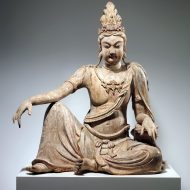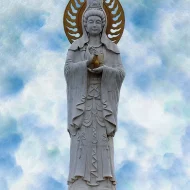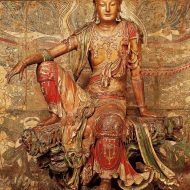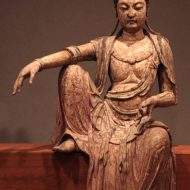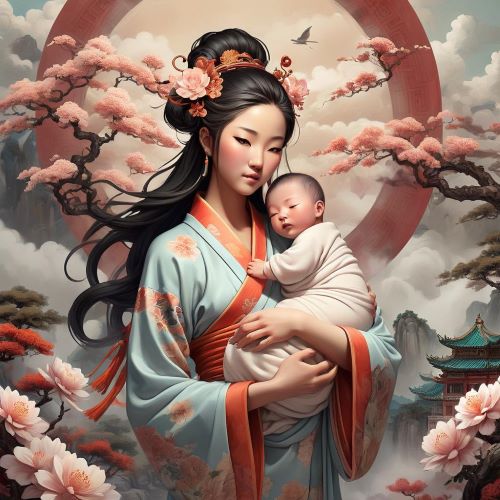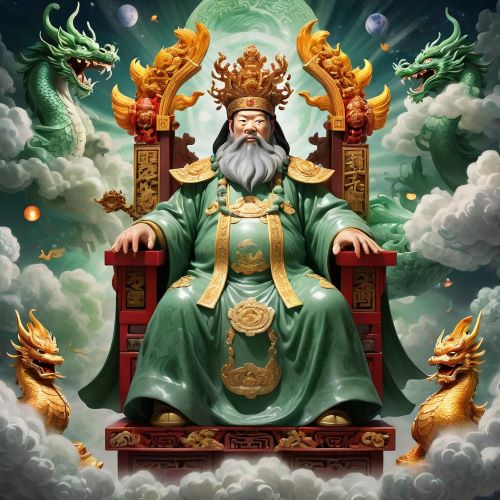Guanyin : Goddess of Mercy
Listen
At a glance
| Description | |
|---|---|
| Origin | Chinese Mythology |
| Classification | Gods |
| Family Members | King Zhuang of Chu (Father), Lady Fan (Mother) |
| Region | China, Thailand, Philippines, Thailand, Khmer, Indonesia, Japan, Mongolia |
| Associated With | Kindness, Mercy |
Guanyin
Introduction
Within Chinese mythology, Guanyin is held in reverence as the goddess of mercy, embodying compassion in a concrete form. She possesses divine attributes that encompass the ability to see and hear all, drawing in worshipers who seek solace from her during times of uncertainty, despair, and fear.
The origins of Guanyin can be traced back to the Hindu deity Avalokiteśvara, whose legend found its way into China during the dissemination of Buddhism. Through the process of syncretism, this narrative intertwined with local folklore, ultimately shaping the prevailing understanding of Guanyin. Although she has the capacity to manifest in both male and female forms, in Chinese tradition, she is most commonly depicted as a female figure. It is this form that we shall be discussing here.
Physical Traits
Guanyin is typically portrayed donning a graceful white robe adorned with jade necklaces. In Chinese culture, the hues of white and jade both carry connotations of purity. Her customary depiction includes holding a vessel of water in one hand and a willow branch in the other, while being commonly illustrated standing atop a dragon, seated upon a lotus flower, or gracefully riding among the clouds.
Family
Despite her numerous reincarnations, Guanyin’s initial identity traces back to being the daughter of King Zhuang of Chu and his wife, Lady Fan. Accompanying her are two devoted attendants: Longnü, the granddaughter of the Dragon King, and Shancai, one of her faithful disciples. She is also regarded as the feminine form of the Avaloketishwara
Other names
The name of Guanyin was a translation from the deity’s original Sanskrit name “Avalokiteśvara,” signifying “he who hears the voices of the suffering,” into “Guanshìyin,” which conveys “the one who hears the sound of the world.” Gradually, her name was abbreviated to Guanyin. This appellation encapsulates her capacity to listen to the myriad cries of anguish across the world and her boundless compassion.
Powers and Abilities
Guanyin is a Chinese goddess associated with compassion and mercy. She is known for her miraculous powers to assist all those who pray to her. Guanyin is said to offer protection from all kinds of threats and attacks, cure illnesses, and bestow good health. Women longing for a child may call out to the goddess, and she shows special attention to the helpless, especially children and women. She is also known for helping to solve family problems. Guanyin is often referred to as the “most widely beloved Buddhist Divinity” with miraculous powers to assist all those who pray to her.
Modern Day Influence
Guanyin, the goddess of mercy and compassion from Chinese mythology, has made occasional appearances or inspired characters in modern pop culture. In the animated film “Kung Fu Panda 2” (2011), a character named Soothsayer is visually inspired by Guanyin. Likewise, the TV series “Into the Badlands” (2015-2019) features a character named The Widow who draws loose inspiration from Guanyin in both appearance and actions.
Within the gaming world, the popular first-person shooter game “Overwatch” (2016) introduces a character named Mei, associated with Guanyin’s characteristics of compassion and healing. Mei’s character design also incorporates elements reminiscent of Guanyin’s iconic imagery.
Guanyin’s influence extends beyond media and entertainment. Guanyin holds an immense and enduring presence within Chinese culture, often drawing comparisons to the Virgin Mary in Christianity. She is renowned for offering protection and solace to those enduring pain, suffering, or fear in their lives, with a particular focus on the well-being of women and children. Her benevolent reputation even extends to the belief that she possesses the ability to grant children to parents who are struggling with childlessness.
Explore Some Gods Of Peace In Mythology Here
Related Images
Frequently Asked Questions
What is lorem Ipsum?
I am text block. Click edit button to change this text. Lorem ipsum dolor sit amet, consectetur adipiscing elit. Ut elit tellus, luctus nec ullamcorper mattis, pulvinar dapibus leo.
What is lorem Ipsum?
I am text block. Click edit button to change this text. Lorem ipsum dolor sit amet, consectetur adipiscing elit. Ut elit tellus, luctus nec ullamcorper mattis, pulvinar dapibus leo.
What is lorem Ipsum?
I am text block. Click edit button to change this text. Lorem ipsum dolor sit amet, consectetur adipiscing elit. Ut elit tellus, luctus nec ullamcorper mattis, pulvinar dapibus leo.
What is lorem Ipsum?
I am text block. Click edit button to change this text. Lorem ipsum dolor sit amet, consectetur adipiscing elit. Ut elit tellus, luctus nec ullamcorper mattis, pulvinar dapibus leo.
What is lorem Ipsum?
I am text block. Click edit button to change this text. Lorem ipsum dolor sit amet, consectetur adipiscing elit. Ut elit tellus, luctus nec ullamcorper mattis, pulvinar dapibus leo.

